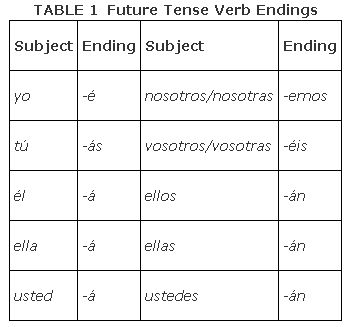There are two ways to form the future tense in Spanish: the simple future, and the informal future. In this lesson, we will show you how to use Spanish future tense to talk about what will happen or to make a prediction about the future.
Spanish simple future tense
The simple future tense is most often used to talk about what a person will do, It can also be used to talk about possibilities in the present, to give solemn commands, or to make predictions about the future.
Formation: Add the correct ending to the infinitive of the verb to form the simple future tense.
Note: All verb conjugations (-ar, -er, -ir) have the same endings in the simple future tense.
Below you will find the table of the verb ending rules in Spanish simple future tense,
Subject | Ending |
| yo | -é |
| tú | -ás |
| usted, él, ella | -á |
| nosotros | -emos |
| vosotros | -éis |
| ustedes, ellos, ellas | -án |
1. To talk about what will or shall happen
Examples:
Jugarás para el equipo nacional - You will play for the national team
Él hablará con su novia esta noche - He will talk to his girlfriend tonight
2. To talk about conjectures, probabilities, or possibilities
The simple future tense can be used to talk about things that are probably true.
Examples:
Anita estará en la playa ahora - Anita is probably at the beach right now
Los niños tendrán hambre - The children might be hungry
¿Dónde estarán mis llaves? - Where will my keys be? / Where could my keys be?
3. To make predictions about the future
Examples:
Encontrará un trabajo bueno - He will find a good job
Si tengo tiempo, saldré a correr en la tarde - If I have time, I'll go running this afternoon
4. To give solemn commands
Te sentarás aquí hasta que regrese - You shall/will sit right here until I return
See also: Spanish present simple tense

Spanish future tense - Verb ending rules
Spanish informal future tense
Formation: The informal future is formed by the combination of the verb "ir", the preposition "a", and an infinitive.
ir + a + infinitive
Note: "ir" must be conjugated to match with the subject of the sentence.
See also: Ir conjugation
"Be going to" expresses that something is a plan. It expresses the idea that a person intends to do something in the future. It doesn't matter whether the plan is realistic or not. It's very common to be used to talk about future events that are certain.
For examples:
Voy a caminar a la playa - I’m going to walk to the beach
Ella va a comprar un coche nuevo - She is going to buy a new car
Él va a leer - He is going to read
¿Vas a estudiar esta noche? - Are you going to study tonight?
Vamos a nadar en la piscina - We are going to swim in the pool
Ellos van a dormir en el primer piso - They are going to sleep on the first floor
